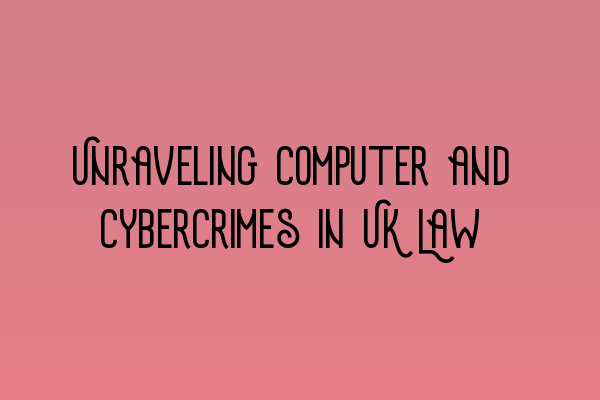Unraveling Computer and Cybercrimes in UK Law
In today’s digital age, computer and cybercrimes have become a pressing concern in the field of criminal law. The advancements in technology have given rise to new forms of criminal activities, necessitating the need for laws and regulations to combat these threats effectively.
Computer and cybercrimes encompass a wide range of illegal activities that involve computers, the internet, and other digital devices. These crimes can range from hacking and data breaches to online fraud and identity theft. They pose significant risks to individuals, businesses, and even national security.
Understanding the intricacies of computer and cybercrimes is crucial for legal professionals to effectively handle cases related to these offenses. As an SQE Criminal Law & Practice Law UK solicitor, it is essential to equip yourself with the knowledge and skills required to tackle such cases successfully.
Legislation and Legal Framework
The legal framework surrounding computer and cybercrimes in the UK is constantly evolving to keep pace with technological advancements. The Computer Misuse Act 1990 is one of the primary legislations that address computer-related offenses. It criminalizes activities such as unauthorized access to computer systems and the creation and distribution of malicious software.
Additionally, the Data Protection Act 2018 incorporates provisions related to the security of personal data and the obligations of data controllers and processors. This legislation plays a crucial role in prosecuting cybercrimes involving data breaches and unauthorized disclosures.
Besides these, various other UK laws and regulations, such as the Fraud Act 2006 and the Proceeds of Crime Act 2002, can be applied to prosecute specific computer and cybercrimes. A comprehensive understanding of these laws is vital for successful legal representation.
Investigation and Evidence Collection
Investigating computer and cybercrimes requires specialized knowledge and investigative techniques. The presence of digital evidence makes it crucial for legal professionals to stay updated with the latest technological advancements and forensic procedures.
The gathering and preservation of digital evidence play a significant role in prosecuting computer and cybercrimes. This evidence can include logs, emails, documents, and other digital artifacts that can help establish the guilt of the accused. Therefore, it is essential to work closely with forensic experts who can extract and analyze digital evidence effectively.
Challenges and Emerging Trends
The ever-evolving nature of technology poses several challenges in combating computer and cybercrimes. Hackers and cybercriminals are constantly finding new ways to exploit vulnerabilities and evade detection. As legal professionals, it is crucial to stay updated with emerging trends in cybercrime to effectively address these challenges.
Some of the emerging trends in cybercrime include ransomware attacks, social engineering scams, and the use of artificial intelligence and machine learning in committing offenses. By staying informed about these trends, you can provide valuable insights and guidance to your clients while ensuring the protection of their interests.
Conclusion
In conclusion, unraveling computer and cybercrimes in UK law requires a comprehensive understanding of the relevant legislation, investigative techniques, and emerging trends. As a solicitor specializing in criminal law and practice, it is vital to stay updated with the latest developments in the field to effectively represent your clients and combat the ever-evolving nature of cybercrimes.
To enhance your knowledge and skills in criminal law and practice, consider enrolling in SQE 1 preparation courses and SQE 2 preparation courses. These courses will provide you with the necessary tools to excel in your legal career and stay ahead in today’s digital landscape.
For more information about SQE exams and important dates, visit SRA SQE Exam Dates.
